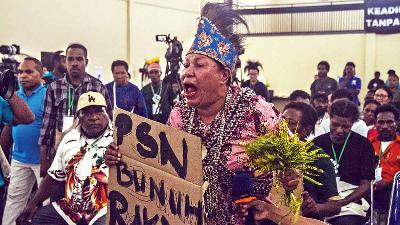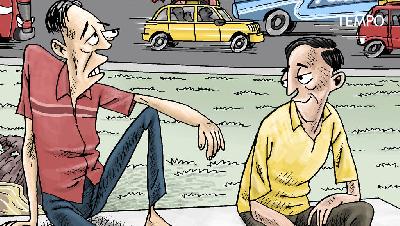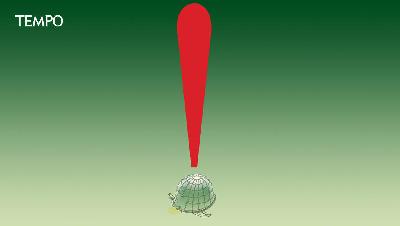A Deep Breath to Opposing Problematic Projects
Monday, April 7, 2025
The Prabowo administration continues the national strategic projects that have been proven problematic. There needs to be a united movement to oppose them.
arsip tempo : 174481110798.

NATIONAL strategic projects (PSN) that it is claimed will accelerate development have in fact repeatedly harmed local people. And in a number of locations, these projects have triggered conflict, deprived people’s living space and damaged the environment. Behind the shiny jargon of ‘strategic,’ there are a number of problems that have disadvantaged people living nearby.
In this context, civil groups and victims of the national strategic projects need to unite their forces to oppose the injustice behind this strategic project label. The declaration of Merauke Solidarity on March 14, 2025, is an example of a strident call from South Papua. The forum shows how people are realizing more and more that resistance cannot go on alone. Those whose rights have been taken away by PSNs should establish more united, widespread and organized opposition networks.
But it is not enough to oppose simply by taking to the streets. The struggle must move into the realm of law and policy. It is time that civil groups challenged the legal basis of PSNs: Presidential Regulation No. 3/2016 on the Accelerated Implementation of PSN. This presidential regulation, which has been revised three times, should be challenged at the Supreme Court.
There are sound reasons for this. The regulation is at odds with Law No. 25/2004 on the National Development Planning System. This law mandates development to be planned in a systematic, directed, integrated and comprehensive way, also responsive to changes. But the fact is that many PSNs appeared suddenly—without being included in the long-term plan, without any public participation and were immediately made legal through the use of the ‘strategic’ label.
This strategic label often rolls out the red carpet to investors close to the government: permits are issued more quickly, people are evicted from their land, and projects are rushed. As a result, there is environmental damage and local people are displaced. In Rempang, Batam, Riau Islands, people were forced to vacate their land to make way for the Rempang Eco-City. In Merauke, Papua, the food estate program led to the felling of forests and clearing of farmers’ fields.
Lobbying and dialogue should also be sought, but civil groups should be wary and keep their distance from the government. The past mistakes must not be repeated. During the Joko Widodo administration, many activists who subsequently joined the government remained silent when they witnessed injustice. It is easy for the opposition to lose its teeth if it gets too close to the Palace.
And support for this opposition at the grassroots level is still important. Solidarity from organizations such as the Flores Catholic Church show the power of moral pressure. In a provincial meeting on March 13, 2025, bishops declared their opposition to a geothermal energy project in Manggarai, East Nusa Tenggara. This statement also refuted the government’s claim that the church supported the project.
All forms of support and means of struggle are needed to keep the fight going and give it stamina, especially since President Prabowo Subianto has said that he will continue with and expand PSNs through the 2025-2029 National Medium Term Development Plan. This means the challenges for the victims of PSNs in his administration will become more onerous.
If all the avenues of resistance to national strategic projects continue to be closed off, the last hope is at the ballot box. A general election is a way of determining whether the people still want to elect leaders who oppress them in the name of national development or punish them instead. Unfortunately, there is still a long way to go before the 2029 general elections.











